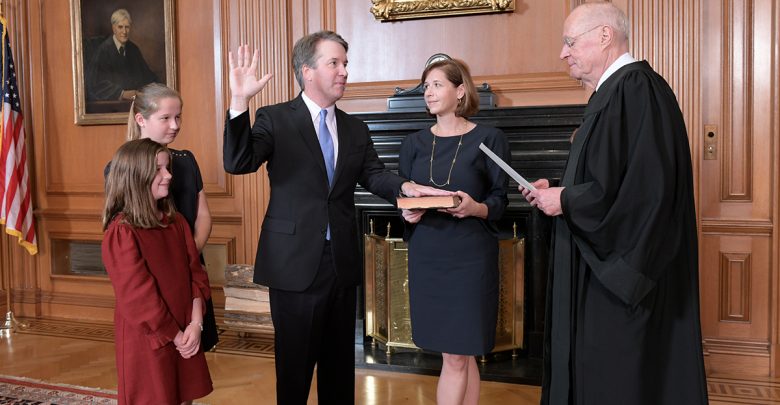With Kavanaugh’s confirmation, is time really up?
Even though many predatory men are still holding of positions of power, we shouldn't disregard the power of the #MeToo movement
 Supplied
SuppliedIn January, I wrote a piece regarding the black dress movement at the 2018 Golden Globes. While the thought was there, I argued, this movement wasn’t really “activism” but instead a symbolic show of support. Society needed to go further in discussing rape culture.
On October 6th, the United States Senate, after a vote of 50-48, confirmed Brett Kavanaugh to the Supreme Court of the United States, a week after Dr. Christine Blasey Ford testified that Kavanaugh sexually assaulted her in the 1980s.
So retrospectively, is time really “up” for predators? I’m sad to say it, but no.
Predatory men like Johnny Depp and Woody Allen are still active in Hollywood despite the claims made at the Golden Globes in January. Even more importantly, however, these men still continue to hold power in the world’s highest governmental and legal institutions.
Brett Kavanaugh is the 114th Supreme Court Justice in U.S. History. 108 of these 114 have been white men. 4 of these 114 have been women. 3 of these 114 have been people of colour. 1 of these 114 has been a woman of colour, which is now equal to the number of Justices confirmed amidst serious sexual assault allegations. In a country characterized by diversity in ethnicity, gender, and sexuality, these statistics reveal that the highest court in America has, for the most part, been representing only one group of the many that make up the country.
During summer 2018, allegations came out that Justin Trudeau had inappropriately groped a reporter at a music festival in 2000. Trudeau released an “apology” statement, claiming that while he did not recall any “negative interactions,” he was sorry if the reporter experienced the interaction negatively. This story circulated in the media for a few weeks, then the country more or less forgot about it. While some may argue that the story of sexual misconduct from 18 years ago shouldn’t force the nation’s leader to step down, the lack of a genuine admission of wrongdoing, the inability to state tangible ways to avoid such behaviour in the future, and the gaslighting of the reporter’s “negative experience” is profoundly disturbing.
The #MeToo movement has undoubtedly been powerful. Now, perhaps more than ever before, people are speaking up about their experiences, from sexual misconduct to harassment and assault. This empowerment is crucial; survivors’ voices need to be amplified, especially in discussing the ways the patriarchy, and especially rape culture, has hurt them.
But is society really treating them any differently? When accusations came out against former Ontario Progressive Conservative party leader Patrick Brown, rumours floated that the story was fabricated by his political adversaries. Trump publicly mocked Dr. Ford, shaming her for not recalling details like the exact date of her assault (it’s worth noting that memory loss is a not-uncommon symptom of trauma). And if she, a white, straight, educated, affluent woman living in America isn’t believed and supported, then it’s likely that due to structures of intersectional oppression, LGBTQ people, people of colour, people living in poverty, sex workers, and countless others are far less likely to be believed or find support after an assault.
With her financial resources and education, Dr. Ford has access to resources that many simply don’t, resources that allowed her to speak up and continue to live in relative safety despite outcry against her allegations. Contrarily, those without material resources, or those discriminated against in the justice system and beyond, may face more obstacles.
A year later, it can be discouraging to look at society’s responses to #MeToo. But while we need to be aware of the ways in which society is failing the women who speak up, it’s equally important to not give up hope or dismiss the importance of continuing to speak. Believing survivors may not un-confirm Kavanaugh, but it’s the most important step in making this important social movement not simply a social media trend, but a powerful form of social activism.




